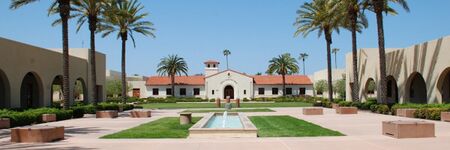Chula Vista CA: Difference between revisions
No edit summary |
No edit summary |
||
| Line 1: | Line 1: | ||
{{Infobox municipality | {{Infobox municipality | ||
|image=Chula Vista City Hall.jpeg | |||
|image_caption=Chula Vista City Hall | |||
|image_seal=Seal of Chula Vista, California.svg | |image_seal=Seal of Chula Vista, California.svg | ||
|municipality=City | |municipality=City | ||
Latest revision as of 18:34, June 12, 2022
- Members
Chula Vista is the second-largest city in the San Diego metropolitan area, the seventh largest city in Southern California, the fifteenth largest city in the state of California, and the 78th-largest city in the United States. The population was 275,487 as of the 2020 census, up from 243,916 as of the 2010 census. Located about halfway—7.5 miles (12.1 km)—between the two downtowns of San Diego and Tijuana in the South Bay, the city is at the center of one of the richest culturally diverse zones in the United States. Chula Vista is so named because of its scenic location between the San Diego Bay and coastal mountain foothills.
The area, along with San Diego, was inhabited by the Kumeyaay before contact from the Spanish, who later claimed the area. In 1821, Chula Vista became part of the newly declared Mexican Empire, which reformed as the First Mexican Republic two years later. California became part of the United States in 1848 as a result of the Mexican–American War and was admitted to the union as a state in 1850.
Founded in the early 19th century and incorporated in October 1911, fast population growth has recently been observed in the city. Located in the city is one of America's few year-round United States Olympic Training centers, while popular tourist destinations include Sesame Place San Diego, North Island Credit Union Amphitheatre, the Chula Vista marina, and the Living Coast Discovery Center.
Activities

|
Chula Vista Smart Waterfront | |
| The Chula Vista smart waterfront is a 535 acre joint development by City of Chula Vista and the Port of San Diego – currently the largest waterfront development project on the U.S. West Coast. The development is groundbreaking in its approach to energy efficiency in (1) targeting 50 percent reduction in annual energy use for the development and (2) each building performing at least 15 percent better than Title 24 requirements in the California Building Energy Efficiency Standards. Recognizing the need to monitor and control this new energy infrastructure, the Bayfront project also focuses on the communications network technologies and smart infrastructure solutions that will provide operational efficiency, sustainability, and economic development opportunities for the City. The Project team, led by Black & Veatch, is focused on evaluating the three major components of energy, telecom, and smart infrastructure – determining solutions that will meet the aggressive energy goals and provide a foundational, scalable approach to future communications and smart city applications. | ||

